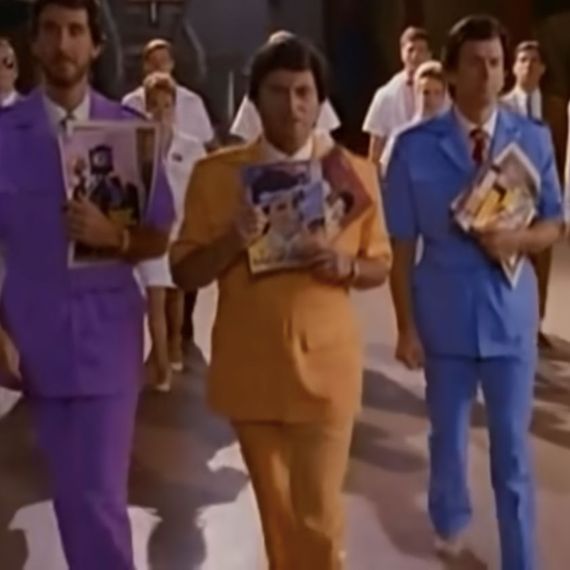After Phil Collins’ Song ‘Jesus He Knows Me’ Exposing the Phony Christian Televangelists on TV We NEVER Hear About Phil Collins (He Attacked Cabal’s False Prophets-How Dare He! LOL)
ASK AN EXPERT NOV. 2, 2021
Dissecting Genesis’ ‘Jesus He Knows Me’ With the Coolest Pastor I Know

“I don’t like the song. It’s probably the production.” Photo: Genesis/YouTube
“Jesus He Knows Me” isn’t really in the upper echelon of Genesis hits. Released in October 1991 during the band’s We Can’t Dance era, the track isn’t Psalms-y as much as it is a brutal skewering of the televangelist movement with Phil Collins, Mike Rutherford, and Tony Banks unleashing their inner heathens at the false prophets who plague small-screen America for money. (The lyrics were so subtle, in fact, Ernest Angley genuinely thought it put him in a great light.) Weirdly, in recent months, I’ve refound “Jesus,” putting it in constant Genesis rotation alongside the likes of “Invisible Touch” and “Follow You Follow Me.” I don’t know if it’s the way Collins snarks “He knows I’m right” or how Banks’s synths glide over each verse like a slow-moving rowboat, but the whole production is an earworm, especially when accompanied with its visually witty music video. Anyway, I knew I had to discuss the song with my pastor from when I was a teenager … the honorable Joel Osteen.
Just kidding. Sorry.
Instead, we have Marc Oehler, the pastor and head of staff at the hottest church in Bergen County, West Side Presbyterian. He has been working there since 2010. Our time at West Side briefly overlapped before I went to college and moved out of my family home, but despite the short stint together, his good-natured personality and the way the younger congregants took a shine to him left a strong impression on me. In tandem with the 30th anniversary of “Jesus He Knows Me,” I recently reconnected with Oehler, a legitimate man of the Lord, to see how someone in his profession interprets the song years later. “Well, it’s interesting to think about,” he began.
https://youtube.com/watch?v=2-rfCnW5VlE%3Frel%3D0%26enablejsapi%3D1
Just to gauge your interest level, how familiar are you with Genesis and my beloved Phil Collins?
I’ll be honest, I was never a big Phil Collins fan. I loved “In the Air Tonight.” That was haunting and always grabbed me. I grew to love Peter Gabriel and prefer his Genesis era. There’s something about Phil Collins … Well, as I’ve gotten more into music, it’s amazing he’s drumming and singing at the same time. I don’t know how people do that. I think he’s incredibly talented. I had a crush in high school who loved one particular Phil Collins song. It never worked out with her, and I think that really clouded my Phil Collins judgment. Now, though, when I told my wife about “Jesus He Loves Me,” she was like, Oh, that’s a bop for me! I don’t think I’ve ever listened to We Can’t Dance in full, but my wife had that album for several years. That’s my background with the band.
Oh my God, but I hate “Sussudio.” That song drove me crazy. You know who Phil Collins reminds me of? Billy Joel. Up to a certain point — until he started dating Christie Brinkley — I was onboard with Billy Joel. And then he did “Uptown Girl.” That was an awful song. I hated that song, and then he totally lost me. That’s how Phil Collins went for me after “Sussudio.”
When was the first time you recall hearing the song?
It must have been on MTV or the radio when it was released. I don’t remember the music video specifically, but I’m sure I saw it. If it was after “Sussudio,” there’s a fair chance I tried to ignore it. I was aware of popular music at that point. I was in a college fraternity with a bunch of music snobs. Yeah, I had to have heard it first in that setting.
So by that logic, I’m assuming you’ve never mentioned “Jesus He Knows Me” in a sermon.
Never. I’m 100 percent sure I’ve never addressed it. Although I’ve taken on the themes of the song repeatedly.
What are some of those themes?
Faith is an acknowledgment of so much we don’t know. Certainty has been conflated with faith, which I think is a mistake. In the Bible, nobody was certain of anything. You’re just trying to follow your sense of God’s call. We make mistakes. We take two steps forward and three steps back. Certainty, to me, is the opposite of faith. This slick minister type who has got all the answers, that’s not a creation of the Gospel. That doesn’t reflect what Jesus was leading us toward. That’s the ego taking center stage and using God for our own purposes.
Another element of this is the prosperity gospel, which you hear a lot of from Joel Osteen. This whole theology that if you believe in Jesus, he’s going to bless you with riches. Jesus himself debunks that! He talked about taking up your cross and living a life of humble service and sacrifice and how it rains on the evil and the just and the good and the bad. There’s a certain randomness to life. I saw some of that in the music video. Isn’t there a little bit of a sexual undertone?
Oh, for sure. There’s one line that goes, “I believe in family / With my ever-loving wife beside me / But she don’t know about my girlfriend / Or the man I met last night.”
Yeah, that’s right. That’s a funny line. You know what, I probably took Phil Collins more seriously than he took himself on some of his songs. This song is a parody! Now that I can revisit it with those eyes, I’m like, He’s doing something pretty interesting here. I was reading recently that the highest percentage of people watching porn in any state in America is Utah. Think about that!
We’ve tragically seen these charismatic televangelists, one after the other, and it continues today. That’s part of the work we ministers have to do on our own souls. You can let things get to your head and use power in manipulative and abusive ways. That’s a pretty consistent story line over the years. There’s a relationship between spirituality and sexuality; there’s an intimacy. You have to be aware of that line. You’re dealing with people of great vulnerability, and that can be exploited just like anything else. We have to use our power with humility and compassion, or else we can do some serious damage. That’s part of the prophetic dimension of the song.
How effective is Phil at conveying his disdain for false prophets?
I think he’s very effective. A lot of these creative people tend to attract those who are already conditioned to agree with them. Would the song work with people who are in the throes of that intoxicating culture? Would it cut through that and impact that in a transformative way? Probably not. Generally speaking, humor and parody are effective ways to get your point across. It’s nonthreatening enough that it can wash over somebody who’s not ready to hear it. I wonder how Phil Collins decided to do this song with Genesis and not for his solo stuff. It’s like Neil Young: He’d do Crazy Horse, and then he would do his own stuff. I want to know if he wrote the song with Genesis in mindCollins, Rutherford, and Banks wrote and composed the song as Genesis in 1991. They were motivated to do so after witnessing the televangelist movement while touring the U.S. years earlier.. It’s interesting to me to think about. He was living in both places and knew where to go with his songs.
What was the most striking visual image in the music video for you?
It’s very superficial. I’m color-blind, but it felt like the colors were unnatural.




Clockwise from top left: Collins deep in “prayer.” Photo: Genesis/YouTubeRutherford preaching. Photo: Genesis/YouTubeBanks, the hottest member. Photo: Genesis/YouTubeThe trio strutting their stuff. Photo: Genesis/YouTube
I think this is the funniest Genesis song. They hit a mix of humor and meaning with a lyric such as, say, “Just do as I say, don’t do as I do.” Were there any lyrics that were introspective to you as a pastor?
I think the line “Jesus, he knows me / And he knows I’m right” is brilliant. What’s that old saying? “God created us in his image, and we return the favor.” Basically: Whatever you want, pastor. One of the things I really try to push against is … Well, people who are particularly anxious or stressed tend to, in a strange way, get attracted to authoritarian leaders, people who can think for them. You don’t have to use your brain. Here’s how you gotta live. Here’s the three steps you need. I think there’s something strangely comforting in a certain personality type like that.
Pastors will always have the temptation to step into that kind of role, but I try to resist that temptation. I see this modeled in Jesus. He’s trying to invite people to exercise those muscles for themselves. Ultimately, the leader should lead by example. This whole idea of “Don’t do as I do, but listen to what I’m saying” cuts against the very authority of a leader. It’s about how they live their lives and if they exemplify all the tenants they proclaim, preach, and teach. I’m personally attracted to authenticity and integrity. You don’t find any of that in the music video. Phil Collins plays a leader who lacks integrity.
What do you think people find “strangely comforting” in a televangelist or someone like Joel Osteen?
On the good side, I think someone like Joel Osteen has charisma and can appeal to someone who has never entertained faith at all. There’s a gift in that — being able to reach the masses in a way that is accessible. I do think God works through all of us in different ways. Everyone has their gifts. The other thing is there’s so much uncertainty in life. But we feel a need for certainty. A lot of adults are not maturing these days. There’s no clear sense of right and wrong. We need that to get started on a journey. One of my faith teachers likes to say, “We need a solid container to get started on the journey.” At the end, that container will fail us and break open and will usher us into a greater depth of understanding. But we all start there, right? That can be attractive at particular times in our lives and levels of development.
The problem there is we constantly put authority outside ourselves, and we’re always looking for somebody else, so that becomes very easy to manipulate. We have to begin to take some of that and pay attention to our own life experience. We have to check what we’re being taught with reality as we understand and perceive it. I think it can really work for a while in all of our lives until it doesn’t. I did a whole book study on the idea that the “belief system” becomes so connected to the “belonging system” — that to break free from rigid and toxic beliefs is to risk losing the support structure that has been built up in the community. It’s hard to leave these churches because you quickly become ostracized and there’s this whole mentality of, You’re either with us or against us. It can hold people in much longer than they would normally be there. It’s the crab-bucket syndrome where you’re trying to get out but everyone’s pulling you in. Deeper levels of consciousness aren’t going to be supported in communities like the one in Genesis’ music video.
What would you tell a congregant if they suddenly got obsessed with televangelism and wanted to leave the church?
I would ask them why and how it’s speaking to them. I wouldn’t see it as my job to “save” them from that because I couldn’t presume to know what they need. I’d stay connected with them. It would only become problematic if the person tried to bring that whole theology back into my church. Then I’d alter my stance. I mean, I’ve listened to Joel Osteen in the past, but it has been several years now. I’d reiterate that material blessings aren’t the real blessings God wants to give us.
One of your most upstanding congregants, my dad, recently gave me his opinion on the song and video. He feels it “almost seems prescient while at the same time already inappropriate.” Do you agree?
Yeah, I can see that. It’s the now and the not yet. There’s something universal there that will always be part of the mix. It foreshadows that these televangelists are always learning, too. They learn, and they have to change and evolve to maintain their audiences.
Do you feel like the song hits differently in 2021 than it did in 1991? I’m curious if you think there have been changing attitudes toward televangelism — especially within your profession — over the years.
I think the Jesus and John WayneReleased in June 2020, Kristin Kobes Du Mez’s book is a revisionist history of the past 75 years of white Evangelicalism. book has been really helpful in the church-history canon. There was a long movement toward fundamentalism as defined by conservative Evangelicals in the early ’90s. I had to work through that. I saw things differently, and that didn’t intuitively resonate for me. There was a lot of pressure along the lines of, If you don’t believe this, you’re really not a good Christian. A lot of people bought into that story line, but the air has been taken out of the balloon a bit. People have caught on to the game since then, but of course people will still fall under the grip of it. It remains seductive and tempting. There are more people like me who are willing to say, “Hey, that’s actually not the Gospel or what Jesus taught. That’s a misreading.” More of a progressive response that is gaining traction in some ways. And culturally, there’s more of a hunger for authenticity than there was 30 years ago. I think millennials are less attracted to that. Authenticity is a real buzzword these days.
Do you personally like the song? Is this something you’d jam to in your free time?
I don’t like the song. It’s probably the production. Maybe if I heard it in a different format, but I have an aversion to that synth-driven and drum-heavy production. Give me a guitar and a Bob Dylan voice, and I’ll be happy. But because I respect you and your work, I’m going to take another look at it. I’m too quick to judge. Phil Collins — I think I like him more than I realize. Maybe I’m still wounded by this high-school girlfriend.
Has this chat at least inspired you to weave “Jesus He Knows Me” into an upcoming sermon?
I don’t know about that. I have quoted “In Your Eyes” by Peter Gabriel. I’ve used Peter Gabriel in memorial services and quoted the song in sermons. So I’m a Genesis fan at heart but was devastated when Peter left the band.
















